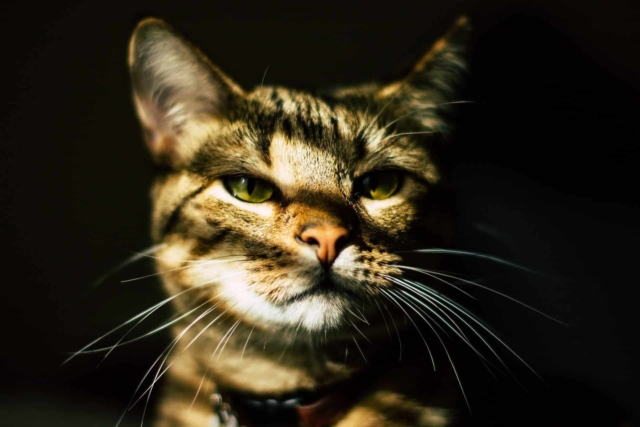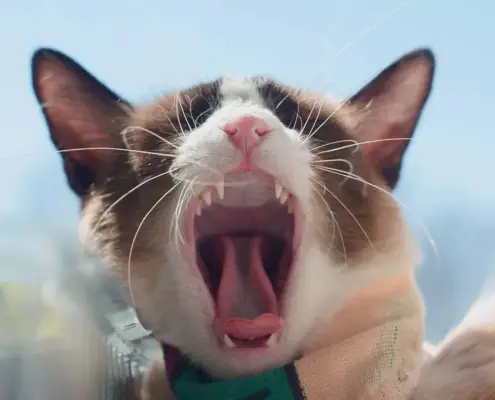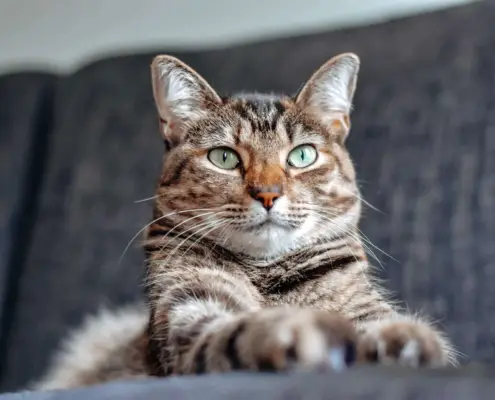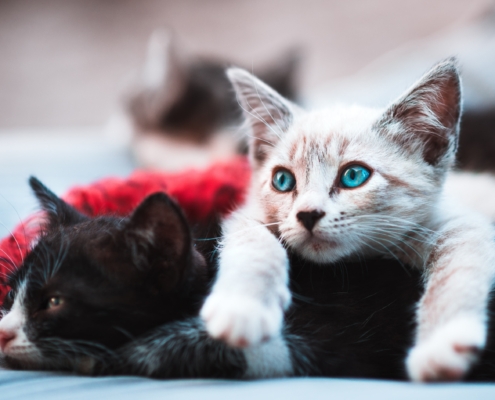
As felines age, it is not uncommon for them to display signs of aggression. Understanding why old cats can become aggressive is essential in order to provide them with the necessary care and support. Aggression in aging cats can be caused by a variety of factors, including physical and medical issues, as well as behavioral changes. By gaining insight into these causes, cat owners can take proactive measures to manage and alleviate their feline’s aggression.
Common Causes of Aggression in Old Cats
Old cats can exhibit aggression due to various reasons. One common cause is pain or discomfort caused by physical ailments such as arthritis or dental issues. These conditions can make cats irritable and more prone to lashing out. Additionally, neurological disorders, such as cognitive dysfunction syndrome, can contribute to aggressive behavior in aging felines. It is important to monitor your cat’s health and consult with a veterinarian to rule out any underlying medical causes.
Physical and Medical Factors Contributing to Aggression
Physical and medical factors can significantly contribute to aggression in aging cats. Chronic pain, for example, can lead to heightened sensitivity and irritability. Cats experiencing pain may react aggressively in an attempt to protect themselves or avoid further discomfort. Furthermore, hormonal imbalances, such as hypothyroidism, can also impact a cat’s behavior and potentially result in increased aggression. Regular check-ups and open communication with your veterinarian can help identify and address these physical factors.
Behavioral Changes and Aggression in Senior Cats
Alongside physical issues, behavioral changes can play a significant role in aggression among senior cats. Cats may become more anxious or fearful as they age, leading to defensive or aggressive behaviors. Changes in their environment, such as the introduction of new pets or people, can also trigger aggression. Additionally, age-related cognitive decline can cause confusion and disorientation, leading to frustration and aggression. Understanding these behavioral changes is crucial in order to provide appropriate support and intervention.
Ways to Help Manage Aggression in Aging Felines
Managing aggression in aging felines requires a multifaceted approach. Creating a calming environment is essential for reducing stress and anxiety. Provide your cat with a quiet space where they can retreat when feeling overwhelmed. Additionally, ensure they have access to comfortable resting areas and engaging toys to help alleviate boredom and redirect their energy.
Implementing behavior modification techniques can also be effective in managing aggression. Positive reinforcement training, such as clicker training, can help redirect your cat’s aggression towards more desirable behaviors. Consistency and patience are paramount throughout the training process. Rewarding your cat for calm and non-aggressive behavior can help reshape their responses.
If aggression persists or worsens, seeking professional help is crucial. A veterinarian or animal behaviorist can assess your cat’s specific situation and provide tailored recommendations. They may suggest additional behavior modification techniques or prescribe medication to help manage aggression. Their expertise and guidance can significantly improve your cat’s quality of life.
Alternative Therapies for Aggression in Aging Felines
In addition to traditional approaches, alternative therapies can be beneficial in managing aggression in aging felines. These therapies can include acupuncture, massage, or herbal remedies. Acupuncture, for example, can help stimulate the body’s natural healing mechanisms and promote relaxation. Massage therapy can reduce muscle tension and stress. Herbal remedies, under the guidance of a veterinarian, can provide natural relief for anxiety and aggression. However, it is important to consult with a professional before pursuing alternative therapies to ensure they are safe and appropriate for your cat’s specific needs.
Conclusion
Understanding aggression in aging cats is crucial for providing them with the care and support they need. Physical and medical factors, as well as behavioral changes, can contribute to aggression in older felines. By creating a calming environment, implementing behavior modification techniques, and seeking professional help when needed, cat owners can effectively manage aggression in their aging feline companions. Additionally, alternative therapies can provide additional support in reducing stress and promoting relaxation. With patience, understanding, and the right strategies in place, aggressive behavior in aging cats can be managed, improving their overall well-being and ensuring a harmonious household.
If you have an aging cat displaying signs of aggression, it is important to seek professional advice. Contact your veterinarian or an animal behaviorist to discuss your cat’s behavior and explore the best strategies for managing their aggression. Remember, with the right support, your cat can enjoy a peaceful and comfortable senior life.
If you enjoyed my article, I would appreciate you sharing it with your network.

Sima Ndlebe
Sima writes for CatBuzz. He is interested in Cats, Health and Fitness, and Entrepreneurship.
Published: 1 November 2023
Related Articles
Disclaimer
The content found on CatBuzz.org is presented on an "as is" basis and is intended for general consumer information and education purposes only. Any utilization of this information is voluntary and solely at the user's own risk.
None of the articles or content should be regarded as, or used in place of, veterinary medical advice, diagnosis, or treatment. The information provided on the website is purely for educational and informational intentions and should not be considered a substitute for professional guidance from a veterinarian or other qualified expert. The articles are designed to inform consumers about veterinary healthcare and medical matters that may impact their cat's daily life. It should be noted that this website and its services do not constitute the practice of any form of veterinary medical advice, diagnosis, or treatment. CatBuzz.org explicitly disclaims any liability for any direct or indirect damages or losses that may arise from the use of or reliance on the information contained within the content.
Consumers must consult a veterinarian, veterinary specialist, or another qualified veterinary healthcare provider when seeking advice regarding their cat's health or medical conditions. It is important not to ignore, avoid, or postpone seeking medical advice from a veterinarian or other qualified veterinary healthcare provider solely based on information obtained from this website. If you believe that your cat may be experiencing a medical issue or condition, it is imperative to promptly contact a qualified veterinary healthcare professional.



